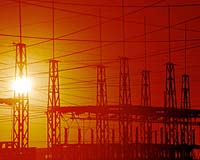 |
Washington DC (SPX) May 12, 2009 Trees positioned to shade the west and south sides of a house may decrease summertime electric bills by 5 percent on average, according to a recent study* of California homes by researchers from the National Institute of Standards and Technology (NIST) and the U.S. Department of Agriculture (USDA). The first large-scale study of its kind, the research paper considers the effects of shade on 460 single-family homes in Sacramento during the summer of 2007 and provides hard statistics showing how well-placed shade trees can reduce energy costs and atmospheric carbon, as well. "People have known for a long time that trees have multiple benefits for people, but we've quantified one of them for the first time using actual billing data and put a dollar value on it," said NIST's David Butry, who authored the paper with Geoffrey Donovan of the USDA Forest Service's Pacific Northwest Research Station. The study's findings included: + Planting trees on the west and south sides of a house decreased summertime electricity use, but planting them on the north actually increased it. Those on the east had no effect. + Fast-growing trees provide better help than do smaller ones, and placement of the trees, particularly the distance from the house, is a significant factor. + A London plane tree, planted on the west side of a house, can reduce carbon emissions from summertime electricity use by an average of 31 percent over 100 years. This last finding was particularly significant to Butry, who said that trees not only reduce the carbon produced by the local gas or coal-fired power generator, but also remove carbon dioxide-a greenhouse gas-from the atmosphere. "Trees sequester carbon in addition to providing shade," Butry said. "We measured how much these shade trees reduced the carbon created by burning fuels to produce the electricity, and found that the trees also sequestered an equivalent amount of carbon on top of that. So there's a double benefit." Utility companies from as far away as South Korea and South Africa have contacted the team about expanding the study, which was limited to a single season in a single city. "It would be really interesting to look at how the effect varies across regions of the U.S. and of the world, and to see what happens in wintertime," Butry said. "Sacramento Municipal Utility was very helpful in providing us with the data we needed. But future studies will depend on who has data and shares it with us." Share This Article With Planet Earth
Related Links National Institute of Standards and Technology (NIST)
 Report Examines Limits Of National Power Grid Simulations
Report Examines Limits Of National Power Grid SimulationsArgonne IL (SPX) May 12, 2009 America's power grid today resembles the country's canal system of the 19th Century. A marvel of engineering for its time, the canal system eventually could not keep pace with the growing demands of transcontinental transportation. More than 150 years later, America's infrastructure is again changing in ways that its designers never anticipated. Distributed and intermittent electrici ... read more |
|
| The content herein, unless otherwise known to be public domain, are Copyright 1995-2009 - SpaceDaily. AFP and UPI Wire Stories are copyright Agence France-Presse and United Press International. ESA Portal Reports are copyright European Space Agency. All NASA sourced material is public domain. Additional copyrights may apply in whole or part to other bona fide parties. Advertising does not imply endorsement,agreement or approval of any opinions, statements or information provided by SpaceDaily on any Web page published or hosted by SpaceDaily. Privacy Statement |